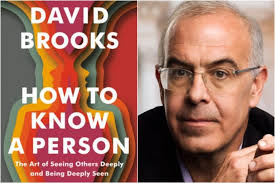I was sitting around a table with some friends. How did the topic come up? I don’t quite recall.
We were talking about World War II, and Ralph said, “You can’t trust the Germans. Look what they’ve done in two world wars. And don’t say they’ve changed because skinheads and nationalism are on the rise there. We just should never have let them become an independent nation again. We should have carved up the country for good.”
I was a bit surprised to hear such ideas about a group of people who have little malice thrown at them these days. He didn’t sound angry. He wasn’t loud. He was outwardly calm, but I sensed there was emotion underneath.
I responded evenly by saying it seemed helpful to have them as allies, as a force for economic and political stability in central Europe. Clearly he still disagreed.
 Then I remembered what I had just read in David Brooks’s new book, How to Know a Person. He told a story of being on a panel discussion with someone who had a very different view of the culture wars. Brooks responded not with anger or diatribe but by stating his side with a bit of cool dispassion.
Then I remembered what I had just read in David Brooks’s new book, How to Know a Person. He told a story of being on a panel discussion with someone who had a very different view of the culture wars. Brooks responded not with anger or diatribe but by stating his side with a bit of cool dispassion.
Later Brooks realized this was the wrong approach. Instead he should have at least asked more questions about what the other person thought and why.
Taking Brooks’s lead, I decided I too was wrong and that the important thing in this moment was not to try to change Ralph’s mind, not to correct him, however wrong his attitudes might be. My job first was to listen to him, get to know him, and maybe love him a little better.
So I started asking some questions, genuinely wanting to know more: “What’s behind your thoughts here? When and how did you first start to think this way?” And quietly he began to tell us more of his story.
His father and uncles had been in the war. What they saw and went through was terrible. And his wife had been born in central Europe. Her family had suffered at the hands of the Germans for multiple generations.
Ralph was not speculating on geopolitics. For him, this was personal.
Brooks is a consummate journalist who is excellent at summarizing the best research of experts while telling stories of others and himself that move us and create understanding. While offering excellent material on how to get to know people as individuals, he reminds us that everyone is situated in a group, in a history, in a place. We also have to explore and appreciate those to truly hear others.
In a day of hyper reactions and extreme tribalism, we seem to have lost the vital art of conversation, of making friends, of connecting with others more than superficially. Brooks tells us how with practical, sensible wisdom.
I don’t remember the last time I had put the ideas of a book into practice so quickly as I did with Ralph. Before I would have just sat in stunned silence. But now I knew how to respond positively. How to Know a Person is that kind of book, a book worth rereading.

One thought on “How to Know a Person”